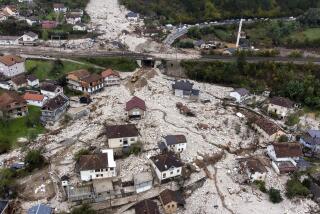Serb Military to Help Evacuate Sarajevo Area
VOGOSCA, Bosnia-Herzegovina — In a candid acknowledgment that efforts to preserve a multiethnic Bosnian capital are failing miserably, the NATO commander in the war-ravaged nation agreed Saturday to allow Bosnian Serb military vehicles to help evacuate residents from Serb-populated Sarajevo suburbs.
The trucks, which will probably be driven by unarmed soldiers in civilian clothing, are expected to arrive in this northern suburb Monday. They will be escorted by North Atlantic Treaty Organization troops, in a sharp departure from NATO’s insistence over the past few weeks that it would not be drawn into the deepening humanitarian crisis here and in four other Bosnian Serb suburbs.
“We would certainly prefer not to,” U.S. Adm. Leighton W. Smith, NATO’s commander in Bosnia-Herzegovina, said of the stepped-up role for the peace implementation force, known as IFOR. “The problem is that there are not enough vehicles here. People are frightened. I think we are beyond the stage of trying to get them to stay.”
The extraordinary NATO involvement was criticized by a spokesman for the largest relief organization in Bosnia, who said NATO is allowing itself to be manipulated by the Bosnian Serb leadership, which has encouraged the mass departure as the suburbs come under Bosnian government control.
“People are genuinely afraid, but they have been incited to fear,” said Kris Janowksi of the Office of the U.N. High Commissioner for Refugees, who has characterized the wholesale evacuation as voluntary “ethnic cleansing” by Bosnian Serb officials.
Smith acknowledged that his decision was controversial, but he defended it as within NATO’s mission to ensure unrestricted and safe movement of people throughout Bosnia.
“There was some concern expressed at various levels that IFOR, by doing this, could possibly be accused of assisting ethnic cleansing,” he said. “Clearly, that is not the case. . . . It is not easy. We recognize it is an enormously emotional problem for these people. We want to allay as much as we can the fear.”
The move to allow Bosnian Serb soldiers into territory they begrudgingly relinquished under the peace agreement reached last year in Dayton, Ohio, came on the same day that NATO resumed high-level contacts with Bosnian Serb military leaders.
*
British Lt. Gen. Michael Walker, who commands NATO ground forces in Bosnia, told reporters after a meeting with Bosnian Serb Maj. Gen. Zdravko Tolimir in Ilidza, another Serb-held suburb, that links had been formally reestablished. Walker had given Tolimir until Saturday to get relations back on track or risk a continuation of U.N.-imposed economic sanctions against the Bosnian Serbs.
The resumption of ties, if maintained, will end more than two weeks of uncertainty about the Bosnian Serbs’ participation in the peace process that followed a Feb. 8 announcement by their army commander, Gen. Ratko Mladic, breaking off military relations.
Contacts “that had been frozen are unfrozen,” Walker said.
NATO’s foray into the volatile issue of Serbs living on the outskirts of Sarajevo was thrust upon it by the growing paralysis of international mediators charged with easing problems here.
Under the peace agreement, five Serb-populated suburbs will revert to Bosnian government control by March 19.
The first transfer of law enforcement authority came Friday in Vogosca. Promises that U.N. police would carefully track the movements of the new Muslim-Croat federation police force were not honored, and efforts by U.N. High Representative Carl Bildt, who oversees civilian provisions of the Dayton accord, to stem a stream of fleeing residents from town also fell short.
*
U.N. officials estimate that only 2,000 of the town’s 13,000 wartime residents remain, most stranded in town because they have no way of transporting their household goods. Thousands of others who left over the past few weeks from here and other suburbs would like to return to collect possessions they abandoned in the rush to get out.
“We are just waiting for the trucks,” said Vojin Nikic, 70.
At a stormy meeting Saturday in a jammed auditorium at the town hall, Bildt faced a hostile audience of about 250 people who shouted angry questions at him, at one point chanting: “Liar! Liar! Liar!”
Smith, who joined the meeting late with Bosnian Serb parliamentary leader Momcilo Krajisnik, was treated better, with residents crowding to shake his hand and catch a close-up view.
With NATO’s military authority firmly established in the first 60 days of the peace mission, many Bosnian Serbs now see the peacekeepers as their only sure ticket out of Sarajevo.
“One man stopped me and said, ‘The military aspects are going great--now what can you do to help us with the other part?’ ” Smith said. “I said that we are doing everything we can--we just can’t do everything.”
*
A U.N. official said that Smith, while well intentioned, is stepping into a political minefield by involving NATO in the delicate issue of Sarajevo’s ethnic makeup.
“The problem of ethnic integration has not been resolved in this country,” the official said. “It is probably one of the biggest problems facing this country.”
More to Read
Sign up for Essential California
The most important California stories and recommendations in your inbox every morning.
You may occasionally receive promotional content from the Los Angeles Times.










